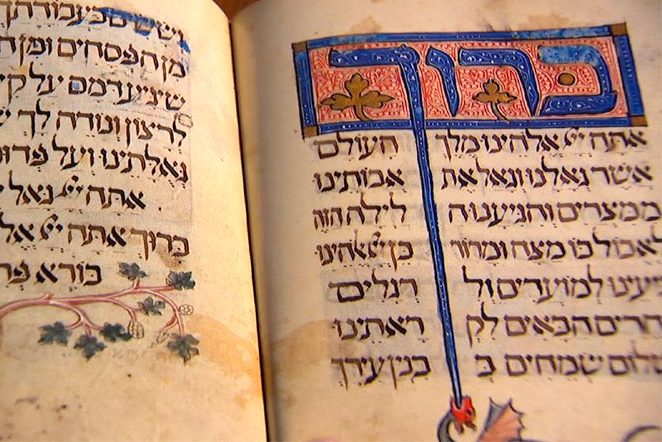For the previous section click here: The Middle Six
In this Section, the Afikoman (the “Tzafun,” or Hidden One) will re-appear, Grace After the Meals is said, the Second Part of Hallel, oriented towards the future, will be sung, and the Seder will be concluded and (we hope) accepted by G-d. The specific steps are:
 12. “Tzafun”
12. “Tzafun”- 13. “Barech”
- 14. “Hallel”
- 15. “Nirtzah”
They are, in detail, as follows:
12. “Tzafun,” the “Hidden One” – the “Afikoman,” Dessert
The Afikoman, which symbolizes the Pesach Sacrifice, which was eaten at the end of the meal, is retrieved from the children (who are hopefully still awake) at a stiff price (actually, other Matzah may be substituted if the children are asleep, they forgot where they hid the Afikoman, or your seven-year old is adamantly demanding a sports car), and eaten before midnight.
13. “Barech” – Make the Blessings After the Meal. The Third Cup of Wine is Drunk. The Cup of Eliyahu HaNavi, Elijah the Prophet, is filled. The door is opened, to show our lack of fear on this “layl shimurim,” this “night of the L-rd’s protection.”
We recite the following, “Pour out Your wrath upon the nations that do not acknowledge You, and upon kingdoms that do not call on Your Name. For they have devoured Yaakov and laid waste His dwelling place. Pour out Your wrath against them and pursue them in anger, destroy them from under the heavens of the L-rd!”
This outburst, full of righteous anger at the vicious enemies of the Jewish People, is tempered somewhat by being followed by “lo lanu,” “Not for us.” That is, paradoxically one of the chapters of Hallel which are omitted on the last six days of the Festival, because G-d says, as it were, “How can you sing praise to Me, while my creatures are drowning in the sea?” G-d is thereby calling upon us to reduce the level of our anger and see even the Egyptians as human beings.
14. “Hallel” – We recite the second part of Hallel, the selection of chapters of Psalms used as special praise for Hashem. This section of Hallel, according to Tradition, is oriented towards the Future, the ultimate Redemption of Israel, and the coming of the “Mashiach.” The Mashiach will be a descendant of “Malchut Beit David,” the Davidic Dynasty, who will be king over Israel and, G-d Willing, will build the Third Temple, and preside over the Return of the Jewish People to Israel and Yerushalayim.
The Fourth Cup of Wine is drunk, with blessings recited before and after, before the fifteenth step of the Seder is reached.
15. “Nirtzah” – The Seder is now over. We pray that our conduct of it was accepted by G-d, even as He would accept the Pesach Sacrifices offered by the Jewish People. We conclude with an additional prayer that we conduct the next Seder in Yerushalayim, meaning the Yerushalayim shel Zahav, the Jerusalem of Gold, of the Time of Mashiach.
“The Seder has now been completed according to Halachah,
Complete in all its laws and ordinances;
As we have merited to observe it in proper order,
May we again merit to celebrate it.
O Pure One, Who dwells on High,
Raise up the Nation which You have called uncountable;
In the near future may You lead those
Who will be planted uprightly;
Redeemed in Tziyon, with joy –
Next year may we celebrate in Yerushalayim!”
Having finished the Seder, the company now sings special songs which celebrate G-d’s role in continually coming to Israel’s aid throughout its history, as an expression of the intimate relationship which exists between the Master of the Universe and His People.
